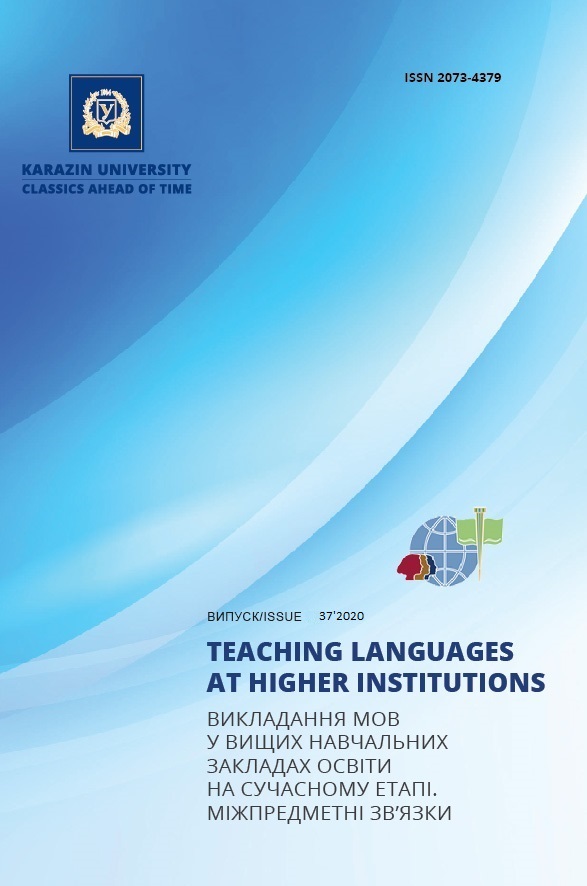Learning as a modified form of individual experience and its place in distance education
Abstract
The nature of learning in the structure of the educational process is explained by the status of individual’s cognitions, i.e. setting processes, procedures, and methods of acquiring knowledge about the phenomena and regularities of the objective world, and factors that go beyond the generative system, i.e. the set of grammatical, semantic, phonological components of language or mental grammar and mental lexicon. Periodical changes in mental activity leading to changes in behavior and obtaining its result as a certain experience are conditioned by its cyclicality. Learning is a cycle of mental mechanisms of the student: telic state – ideation – communicating – localization. Accordingly, a cycle of mental mechanisms of a teacher is aimed at interaction with the thinking process of a student: centering on the student’s personality and development of his abilities – initiation of imagination, creating its product, i.e. a mental image, idea or concept, developing creative potential – cooperation of interaction – localization of interaction, i.e. adaptation depending on the ethno-psycholinguistic portrait of the student and socio-cultural peculiarities of the educational environment in which the training takes place or which is the object of the training. A cycle can be represented as a reference standard of the cognitive system of an individual, as well as of mental activity, its manifestations, and conditions that provoke “random” phase transitions of consciousness states. A cycle is a series of multilevel factors determining the status of cognitive state in real time and participating in the excitation and acceleration of cognitive functions involved in solving a problem, in particular, the function of interaction with different cognitive systems and the information field represented in communication networks. This function acts as a relative model of oneness, integrity of perception of the problem, and approach to its solution in the process of learning.
Downloads
References
Behterev, V.M. (2019). Fenomeny mozga [Brain Phenomena]. Moscow: OOO “Izd-vo AST” [in Russian].
de Bono, E. (2015). Iskusstvo dumat’. Lateral’noe myshlenie kak sposob reshenija slozhnyh zadach [Lateral Thinking: An Introduction]. Moscow: Alpina Pablisher [in Russian].
Vasiljev, I.A, Popluzhnyj, V.L. and Tihomirov, O.K. (1980). Emocii i myshlenie [Emotions and thinking]. Moscow: Izd-vo Moskovskogo un-ta [in Russian].
Vygotskij, L.S. (1934). Myshlenie i rech. Psihologicheskie issledovanija [Thinking and speaking. Psychological research]. Kolbanovskij, V. (Ed.). Moscow-Leningrad: Gos. socialno-ekonomicheskoe izd-vo [in Russian].
Vygotskij, L.S. (1983). Problema umstvennoj otstalosti [The problem of mental retardation]. Sobranie sochinenij [Collected Works]. Vols. 1–6. Vlasova, T.A. (Ed.). Moscow: Pedagogika. Vol. 5. Osnovy defektologii [Fundamentals of defectology], pp. 231–256 [in Russian].
Kashkarov, D.N. (1928). Sovremennye uspehi zoopsihologii [Modern advances in zoopsychology]. Moscow-Leningrad: Gosizdat [in Russian].
Kornilova, T.V. (2016). Intellektualno-lichnostnyj potencial cheloveka v uslovijah neopredelennosti i riska [Intellectual and personal potential of a person in conditions of uncertainty and risk]. St. Petersburg: Nestor-Istorija [in Russian].
Marinosjan, T.N. (2018). Subjekt-objekt obrazovatelnogo processa v realijah sovremennosti, ili IP Aliases → ∞ [Subject-object of the educational process in the realities of our time, or IP Aliases → ∞]. Filosofskie nauki [Philosophical Sciences], 6, pp. 7–30 [in Russian]. DOI: https: //doi.org/10.30727/0235-1188-2018-6-7-30.
Mitrofanova, O.D., Kostomarov, V.G. at al. (1990). Metodika prepodavanija russkogo jazyka kak inostrannogo [Methods of teaching Russian as a foreign language]. Moscow: Rus. jaz. [in Russian].
Potebnja, A. (1892). Mysl’ i yazyk [Thought and language]. Kharkiv: Tip. Adolfa Darre [in Russian].
Slovar terminov po korporativnomu obucheniju [Glossary of corporate training terms]. SberUniversitet [SberUniversity]. Available at: https: //sberbank-university.ru/edutech-club/glossary/ [Accessed 30 Aug. 2020] [in Russian].
Torndajk, Je. (1935). Process uchenija u cheloveka [Human learning process]. Moscow: Uchpedgiz [in Russian].
Bloom, B.S. (1956). Taxonomy of Educational Objectives. The Classification of Educational Goals. Handbook 1: Cognitive Domain. London: Longmans, Green and Co LTD / NY, Michigan: Edwards Bros., Ann Arbor [in English].
Dennett, Daniel C. (1998). The Intentional Stance. Seventh printing. London: A Bradford Book The MIT Press Cambridge, Massachusetts [in English].
Dennett, Danie C. (1988). Evolution, Error, and Intentionality. In: Y. Wilks and D. Partridge, (Eds.). Sourcebook on the Foundations of Artificial Intelligence. New Mexico University Press [in English].
Grossman, P.L., Smagorinsky, P. and Valencia, Sh. (1999). Appropriating Tools for Teaching English: A Theoretical Framework for Research on Learning to Teach. American Journal of Education. Vol. 108 (1), pp. 1–29 [in English].
Nuttin, J. (1953). Tâche réussite et échec. Théorie de la conduite humaine. Paris-Amsterdam [in English].
Schunk, D.H. (2012). Learning Theories. An Educational Perspective. Boston, Columbus, Indianapolis, NY: Pearson [in English].
Skinner, B.F. (2014). Verbal Behavior. Cambridge, Massachusetts: B.F. Skinner Foundation Reprint Series [in English].

